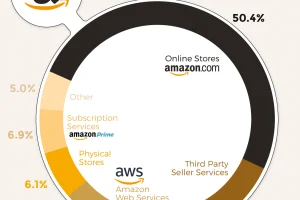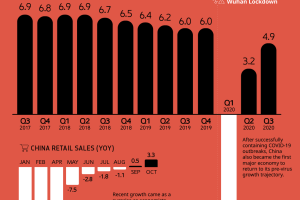The Briefing
- Petroleum is the top import across the Americas (Northern America, the Caribbean, Central America, and South America)
- The U.S. is the #1 importer worldwide. In 2018, its total product import value reached $2.4T
The Top Import in Each Country: The Americas
Almost all nations across the globe import goods from other countries. But what types of products are in high demand, and to what degree are these hot commodities exchanged worldwide?
Today’s graphic provides an overview of the top imports across the Americas. For brevity, we’ve excluded regions with an import value below $1 billion.
The Top Imports, by Country
Petroleum is the most popular import across the Americas region. In fact, it’s the top import in 15 of the 22 countries included on this list:
| Country / Region | Continent | Top Import | Import Value (2018, $B USD) |
|---|---|---|---|
| 🇨🇦 Canada | Northern America | Vehicles | 29.4 |
| 🇺🇸 United States of America | Northern America | Vehicles | 176.8 |
| 🇰🇾 Cayman Islands | The Caribbean | Ships | 3.2 |
| 🇧🇸 Bahamas | The Caribbean | Ships | 2.1 |
| 🇩🇴 Dominican Republic | The Caribbean | Petroleum | 1.6 |
| 🇱🇨 Saint Lucia | The Caribbean | Petroleum | 1.2 |
| 🇲🇽 Mexico | Central America | Petroleum | 31.3 |
| 🇵🇦 Panama | Central America | Petroleum | 5.6 |
| 🇬🇹 Guatemala | Central America | Petroleum | 2.0 |
| 🇨🇷 Costa Rica | Central America | Petroleum | 1.6 |
| 🇸🇻 El Salvador | Central America | Petroleum | 1.1 |
| 🇭🇳 Honduras | Central America | Petroleum | 1.2 |
| 🇧🇷 Brazil | South America | Petroleum | 11.7 |
| 🇦🇷 Argentina | South America | Vehicles | 5.0 |
| 🇨🇱 Chile | South America | Vehicles | 4.8 |
| 🇻🇪 Venezuela (Bolivarian Republic of) | South America | Petroleum | 4.5 |
| 🇵🇪 Peru | South America | Petroleum | 3.5 |
| 🇪🇨 Ecuador | South America | Petroleum | 2.9 |
| 🇨🇴 Colombia | South America | Petroleum | 2.9 |
| 🇺🇾 Uruguay | South America | Petroleum | 2.3 |
| 🇬🇾 Guyana | South America | Ships | 1.5 |
| 🇵🇾 Paraguay | South America | Petroleum | 1.3 |
Vehicles are the second most popular, ranking as the number one import in four of the 22 countries. Cars are particularly popular in Northern America— they’re the top import in both the U.S. and Canada.
Lastly, ships place third, snagging the top spot in three of the 22 countries. Interestingly, two of these nations are in the Caribbean.
The Top 10 Regions, by Import Value
When looking at which nations import the most of their top product, the U.S. leads the pack.
In 2018, the U.S. imported $176.8 billion worth of foreign vehicles—around $147 billion more than its northern neighbor, Canada:
| Region | Top Import | Import Value (2018, $B USD) |
|---|---|---|
| 🇺🇸 United States of America | Vehicles | 176.8 |
| 🇨🇦 Canada | Vehicles | 29.4 |
| 🇲🇽 Mexico | Petroleum | 31.3 |
| 🇧🇷 Brazil | Petroleum | 11.7 |
| 🇵🇦 Panama | Petroleum | 5.6 |
| 🇦🇷 Argentina | Vehicles | 5.0 |
| 🇨🇱 Chile | Vehicles | 4.8 |
| 🇻🇪 Venezuela (Bolivarian Republic of) | Petroleum | 4.5 |
| 🇵🇪 Peru | Petroleum | 3.5 |
| 🇰🇾 Cayman Islands | Ships | 3.2 |
The U.S. relies heavily on Mexico for its foreign vehicles—it imported over 2 million light vehicles from south of the border in 2018. Manufacturing of vehicles and associated parts makes up nearly 18% of Mexico’s total exports.
Yet, while the U.S. imports a lot of foreign cars, the country exports its fair share of vehicles as well, especially to Canada. In fact, the U.S. is Canada’s top source for imported vehicles.
The high volume of trade between Mexico, the U.S. and Canada is fairly unsurprising, given the trade agreement between the three countries. Since the North American Free Trade Agreement (NAFTA) came into effect in 1994, Mexico in particular has seen a significant boost in trade activity. In 2018, imports accounted for 39% of Mexico’s GDP—a 21 percentage point rise from 1994.
»To learn more about the top imports worldwide, read our full article Mapped: The World’s Biggest Importers in 2018
Where does this data come from?
Source: BACI, UN Comtrade
Details: BACI is an international trade database, providing information on bilateral trade flows for more than 5000 products and 200 countries. It pulls data directly from the United Nations Statistical Division (UN Comtrade)
Notes: For more information on methodology, visit the CEPII website





